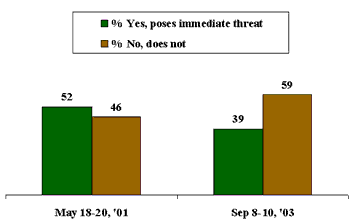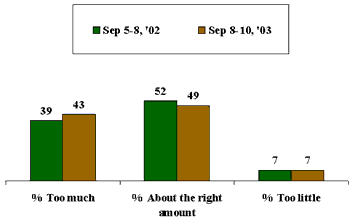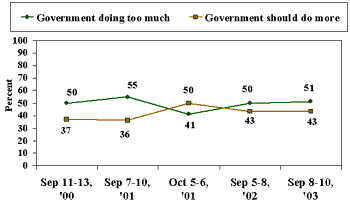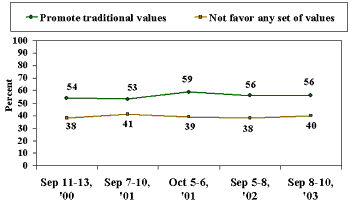GALLUP NEWS SERVICE
PRINCETON, NJ -- The USA Patriot Act -- the anti-terrorism law that was signed shortly after the Sept. 11 attacks -- has become a lightning rod for civil libertarians who are concerned that it gives the federal government too much power to investigate people's personal records. On its Web site, the American Civil Liberties Union -- the nation's leading civil libertarian lobby group -- lists no fewer than 12 constitutional rights they believe the Patriot Act threatens. In part to combat this sort of criticism, Attorney General John Ashcroft recently toured numerous law enforcement agencies around the country to tout the legislation's successes.
Forceful backlash against the Patriot Act by professional political groups has been evident. Less clear is whether average Americans feel the federal government today is threatening their rights. In fact, the percentage of Americans who currently believe that the federal government is a menace to civil rights is down considerably from levels prior to Sept. 11, 2001.
According to Gallup's annual Governance poll, conducted Sept. 8-10, only 39% of Americans currently agree with the statement, "the federal government has become so large and powerful that it poses an immediate threat to the rights and freedoms of ordinary citizens." Four months before the Sept. 11 terrorist attacks, in a May 2001 Gallup survey, more than half the public (52%) held this view.
| Do you think the federal government has become so large and powerful that it poses an immediate threat to the rights and freedoms of ordinary citizens, or don't you think so? |
 |
More generally, when asked whether the federal government has too much power, the right amount of power, or too little power, a majority of Americans say it either has the right amount of power (49%) or too little power (7%); less than half (43%) say it has too much power.
A year ago at this time, Americans were slightly less likely than they are today to say the government had too much power; 39% felt that way in September 2001. But that figure was recorded 11 months after passage of the Patriot Act, and thus does not provide a clear indication of how attitudes toward governmental power have changed since its inception.
| Do you think the federal government today -- has too much power, has about the right amount of power, or has too little power? |
 |
Of course, the Patriot Act was born out of public and political demand for the government to prevent future terrorist attacks. One indication of this reaction is seen in a long-term Gallup trend question that divides the public according to those who want the government to do more to solve the country's problems, and those who want the government to do less. As a direct result of the 9/11 attacks, the percentage of Americans wanting the government to do more jumped from 36% (in a poll conducted Sept. 7-10, 2001) to 50% (Oct. 5-6, 2001). A year later, the percentage favoring more government action had settled back to the midpoint between these two ratings (43%), and it remains at that level today.
Thus, on the basis of this question, one could say that Americans are slightly more likely today to want government to play an active role in solving the nation's problems than they were prior to Sept. 11, 2001. (However, more Americans have consistently said that the government is doing too much rather than not doing enough.)
| Some people think the government is trying to do too many things that should be left to individuals and businesses. Others think that government should do more to solve our country's problems. Which comes closer to your own view? |
 |
At the same time, since Sept. 11, there has been no change in Americans' reactions to the role the federal government should play in regard to cultural values.
| Some people think the government should promote traditional values in our society. Others think the government should not favor any particular set of values. Which comes closer to your own view? |
 |
Americans' perceptions of the extent of government's power today are not especially partisan. Perhaps that is because prominent critics of the Patriot Act (or at least Ashcroft's implementation of it) can be found on both the political left and right, ranging from Congressman Butch Otter, R-Idaho, and the conservative Free Congress Foundation, to the ACLU, People for the American Way, and Democratic senator and presidential candidate John Edwards of North Carolina.
Democrats and self-described liberals are only slightly more likely than Republicans and conservatives to say that the federal government today has too much power. Older men (those 50 and older) and rural Americans are among the most likely of any demographic groups to believe government has too much power. No significant differences are seen on this question by gender or race. Only minor differences are seen by education.
|
Perceived Power of the Federal
Government |
|||
|
Too much power |
About the right amount |
Too little power |
|
|
% |
% |
% |
|
|
National Adults |
43 |
49 |
7 |
|
Republican |
35 |
59 |
5 |
|
Independent |
46 |
47 |
5 |
|
Democrat |
47 |
41 |
11 |
|
Conservative |
39 |
53 |
8 |
|
Moderate |
44 |
48 |
7 |
|
Liberal |
51 |
44 |
5 |
|
Men 18 to 49 |
37 |
55 |
7 |
|
Men 50+ |
53 |
40 |
6 |
|
Women 18 to 49 |
43 |
52 |
5 |
|
Women 50+ |
41 |
47 |
9 |
|
Urban |
41 |
47 |
11 |
|
Suburban |
39 |
53 |
7 |
|
Rural |
52 |
43 |
3 |
In late August, Gallup asked Americans specifically about the Patriot Act. At that time, Gallup found only half the public saying it was generally familiar with the law: 10% of Americans said they were very familiar and another 40% said they were somewhat familiar. And when asked about the impact of the law on constitutional rights, only 22% believed the law went too far in restricting people's civil liberties. About half (48%) felt the law struck the right balance, while 21% felt it did not go far enough.
Survey Methods
These results are based on telephone interviews with a randomly selected national sample of 1,025 adults, aged 18 and older, conducted Sept. 8-10, 2003. For results based on this sample, one can say with 95% confidence that the maximum error attributable to sampling and other random effects is ±3 percentage points. In addition to sampling error, question wording and practical difficulties in conducting surveys can introduce error or bias into the findings of public opinion polls.
26. Some people think the government is trying to do too many things that should be left to individuals and businesses. Others think that government should do more to solve our country's problems. Which comes closer to your own view?
|
Government |
Government |
No |
|
|
% |
% |
% |
|
|
2003 Sep 8-10 |
51 |
43 |
6 |
|
2002 Sep 5-8 |
50 |
43 |
7 |
|
2001 Oct 5-6 |
41 |
50 |
9 |
|
2001 Sep 7-10 |
55 |
36 |
9 |
|
2000 Sep 11-13 |
50 |
37 |
13 |
|
2000 Aug 18-19 |
54 |
38 |
8 |
|
1999 Sep 10-14 |
55 |
39 |
6 |
|
1998 Oct 29-30 |
50 |
38 |
12 |
|
1998 Apr 17-19 |
59 |
33 |
8 |
|
1997 Jan 31-Feb 2 |
58 |
33 |
9 |
|
1996 Jan 12-15 |
58 |
35 |
7 |
|
1995 Dec 15-19 |
60 |
32 |
8 |
|
1994 Nov 2-6 |
55 |
37 |
8 |
|
1994 Oct 22-25 |
57 |
37 |
6 |
|
1994 Jan 15-17 |
54 |
39 |
7 |
|
1993 Dec 17-19 |
55 |
38 |
7 |
|
1993 Apr 22-24 |
49 |
45 |
6 |
|
1993 Mar 22-24 |
45 |
49 |
6 |
|
1992 Oct 23-25 |
48 |
44 |
8 |
|
1992 Sep 11-15 |
51 |
43 |
6 |
|
1992 Aug 31-Sep 2 |
50 |
43 |
7 |
27. Some people think the government should promote traditional values in our society. Others think the government should not favor any particular set of values. Which comes closer to your own view?
|
Promote |
Not favor |
|
|
|
% |
% |
% |
|
|
2003 Sep 8-10 |
56 |
40 |
4 |
|
2002 Sep 5-8 |
56 |
38 |
6 |
|
2001 Oct 5-6 |
59 |
39 |
3 |
|
2001 Sep 7-10 |
53 |
41 |
6 |
|
2000 Sep 11-13 |
54 |
38 |
8 |
|
1999 Sep 10-14 |
56 |
39 |
5 |
|
1998 Oct 29-30 |
56 |
37 |
7 |
|
1998 Apr 17-19 |
55 |
38 |
7 |
|
1997 Jan 31-Feb 2 |
53 |
40 |
7 |
|
1996 Jan 12-15 |
59 |
36 |
5 |
|
1994 Nov 2-6 |
55 |
37 |
8 |
|
1994 Oct 22-25 |
55 |
40 |
5 |
|
1994 Jan 15-17 |
54 |
40 |
6 |
|
1993 Dec 17-19 |
57 |
37 |
6 |
|
1993 Apr 22-24 |
55 |
39 |
6 |
|
1993 Mar 22-24 |
53 |
42 |
5 |
COMBINED RESPONSES (Q.26-27)
|
"pure |
|
|
"pure |
|
|
|
% |
% |
% |
% |
% |
|
|
2003 Sep 8-10 |
19 |
22 |
19 |
31 |
9 |
|
2002 Sep 5-8 |
18 |
23 |
19 |
29 |
11 |
|
2001 Oct 5-6 |
18 |
30 |
17 |
23 |
12 |
|
2001 Sep 7-10 |
16 |
18 |
22 |
30 |
14 |
|
2000 Sep 11-13 |
16 |
18 |
18 |
30 |
18 |
|
1999 Sep 10-14 |
15 |
23 |
23 |
31 |
8 |
|
1998 Oct 29-30 |
14 |
23 |
19 |
29 |
15 |
|
1998 Apr 17-19 |
13 |
17 |
21 |
34 |
15 |
|
1997 Jan 31-Feb 2 |
13 |
17 |
24 |
31 |
15 |
|
1996 Jan 12-15 |
13 |
20 |
20 |
35 |
12 |
|
1994 Nov 2-6 |
15 |
20 |
20 |
32 |
13 |
|
1994 Oct 22-25 |
16 |
19 |
21 |
33 |
11 |
|
1994 Jan 15-17 |
16 |
20 |
22 |
30 |
14 |
|
1993 Dec 17-19 |
13 |
23 |
22 |
31 |
11 |
|
1993 Apr 22-24 |
17 |
25 |
20 |
27 |
11 |
|
1993 Mar 22-24 |
20 |
27 |
19 |
24 |
10 |
29. Do you think the federal government today -- [ROTATED: has too much power, has about the right amount of power, or has too little power]?
|
Too |
About the |
Too |
No |
|
|
2003 Sep 8-10 |
43% |
49 |
7 |
1 |
|
2002 Sep 5-8 |
39 |
52 |
7 |
2 |
33. Do you think the federal government has become so large and powerful that is poses an immediate threat to the rights and freedoms of ordinary citizens, or don't you think so?
BASED ON –517—NATIONAL ADULTS IN FORM A
|
Yes, immediate |
No, does not |
No opinion |
||
|
% |
% |
% |
||
|
2003 Sep 8-10 ^ |
39 |
59 |
2 |
|
|
2001 May 18-20 |
52 |
46 |
2 |
|
|
2000 Apr 7-9 |
45 |
51 |
4 |
|
|
1996 Mar 8-10 |
50 |
44 |
6 |
|
|
1996 Feb 23-25 |
52 |
43 |
5 |
|
|
1995 Apr 23-24 |
39 |
58 |
3 |
|
|
^ |
Asked of a half sample. |
|||
34. Do you think the federal government poses an immediate threat to the rights and freedoms of ordinary citizens, or not?
BASED ON –508—NATIONAL ADULTS IN FORM B
|
Yes, immediate |
No, does not |
No opinion |
|
|
2003 Sep 8-10 |
30% |
68 |
2 |
44. As you may know, shortly after the terrorist attacks on September 11, 2001, a law called the Patriot Act was passed which makes it easier for the federal government to get information on suspected terrorists through court-ordered wiretaps and searches. How familiar are you with the Patriot Act - very familiar, somewhat familiar, not too familiar, or not at all familiar?
BASED ON -495-NATIONAL ADULTS IN FORM B
|
Very |
Somewhat |
Not too |
Not at all |
No |
|
|
2003 Aug 25-26 |
10% |
40 |
25 |
25 |
-- |
45. Based on what you have read or heard, do you think the Patriot Act - [ROTATED: goes too far, is about right, or does not go far enough] -- in restricting people's civil liberties in order to fight terrorism?
BASED ON -495-NATIONAL ADULTS IN FORM B
|
Too far |
About right |
Not far |
No opinion |
|
|
2003 Aug 25-26 |
22% |
48 |
21 |
9 |
